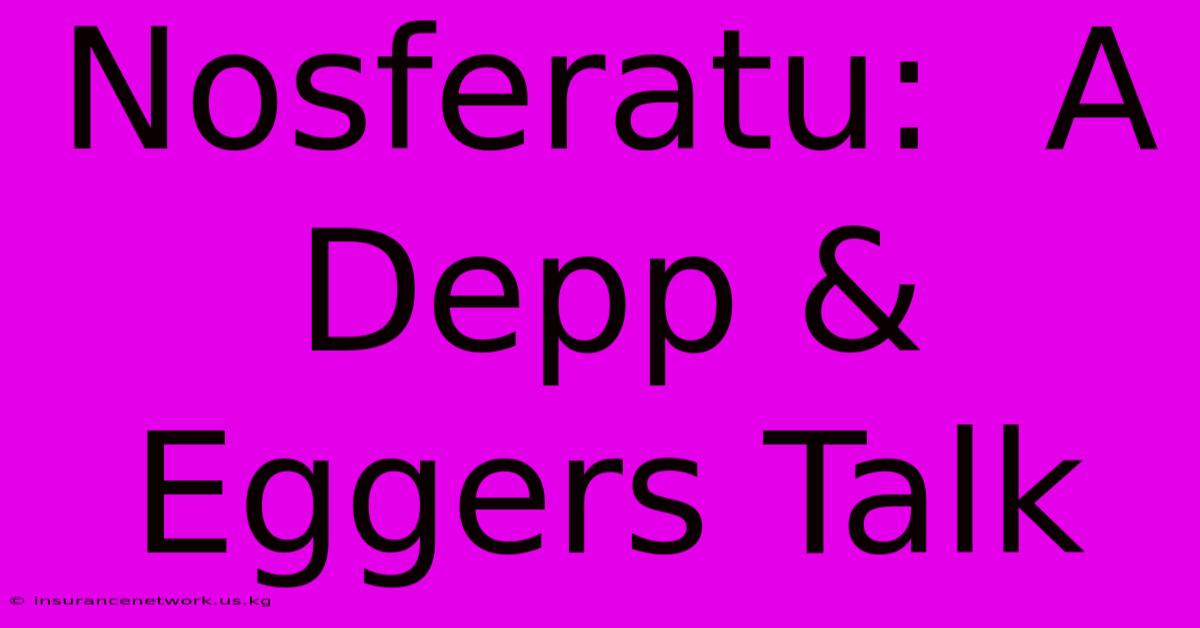Nosferatu: A Depp & Eggers Talk

Discover more detailed and exciting information on our website. Click the link below to start your adventure: Visit Best Website insurancenetwork.us.kg. Don't miss out!
Table of Contents
Nosferatu: A Depp & Eggers Talk - Exploring the Shadows of a Cinematic Masterpiece
The chilling whispers of Nosferatu have echoed through cinematic history, a testament to its enduring power and influence. This silent horror classic, a bold adaptation of Bram Stoker's Dracula, continues to captivate audiences. But what happens when two titans of modern cinema, Johnny Depp and Robert Eggers, engage in a hypothetical conversation about this landmark film? Let's delve into a fascinating exploration of their potential perspectives.
Depp's Eccentric Lens: Embracing the Gothic Grotesque
Johnny Depp, a chameleon-like actor known for inhabiting eccentric characters, would undoubtedly appreciate Nosferatu's unsettling atmosphere and Max Schreck's iconic portrayal of Count Orlok. He'd likely focus on the film's visual language, the stark shadows, the unsettling angles, and the palpable sense of dread.
The Power of Subtext and Silence:
Depp, an actor who thrives on subtle emotional nuances, would undoubtedly analyze the power of silence and unspoken terror in Nosferatu. He might discuss how Schreck's performance, devoid of modern special effects, conveys an unsettling intensity through purely physical presence and subtle gestures. The film's reliance on suggestion over explicit violence is a testament to the power of cinematic implication, a concept that strongly resonates with Depp's approach to acting.
Orlok: A Misunderstood Monster?
Depp might even argue for a degree of empathy towards Orlok, exploring the tragic loneliness and isolation of the character. This aligns with Depp's frequent portrayals of complex, flawed anti-heroes. He might see Orlok not merely as a villain but as a product of his cursed existence, a creature driven by forces beyond his control. This interpretation adds a layer of psychological depth, moving beyond the simple good versus evil dichotomy.
Eggers' Craftsmanship: Honoring the Craftsmanship of the Silent Era
Robert Eggers, a director known for his meticulous historical accuracy and his commitment to creating immersive cinematic worlds (think The Witch and The Lighthouse), would likely analyze Nosferatu's technical brilliance and historical context. He would appreciate the film's innovative use of shadows, its masterful camerawork, and its pioneering approach to horror.
The Innovation of German Expressionism:
Eggers, a master of atmosphere, would likely spend considerable time dissecting the impact of German Expressionism on Nosferatu's visual style. He might highlight the film's use of distorted sets, dramatic lighting, and exaggerated acting to create a truly unsettling experience. This attention to detail and visual storytelling strongly mirrors Eggers' own directorial style.
Respecting the Legacy: A Conversation on Influence:
Eggers might discuss Nosferatu's significant influence on subsequent horror films, tracing its lineage through generations of filmmakers. He would appreciate the film's lasting impact and its ability to inspire fear and awe even today. A conversation between him and Depp would inevitably touch on the enduring power of the silent film era and its relevance to contemporary cinema.
A Shared Appreciation: The Enduring Power of Nosferatu
Despite their different artistic approaches, Depp and Eggers would likely share a deep appreciation for Nosferatu's enduring power. They would both recognize the film's masterful use of visual storytelling, its unsettling atmosphere, and its lasting legacy. The conversation would be a fascinating exploration of cinematic history, a testament to the enduring power of a silent horror masterpiece, and a celebration of the artistry of two remarkable figures in modern cinema. Nosferatu remains a benchmark for cinematic horror, and a hypothetical discussion between Depp and Eggers would illuminate its lasting impact.

Thank you for visiting our website wich cover about Nosferatu: A Depp & Eggers Talk. We hope the information provided has been useful to you. Feel free to contact us if you have any questions or need further assistance. See you next time and dont miss to bookmark.
Featured Posts
-
Season 2 Squid Game Review And Thoughts
Dec 26, 2024
-
Kazakhstan Plane Crash Azerbaijan Airlines
Dec 26, 2024
-
Kazakhstan Plane Crash Azerbaijan Airline Investigation
Dec 26, 2024
-
Steelers Vs Chiefs Worthys Opening Td
Dec 26, 2024
-
Injury Concerns Davis Leaves Game
Dec 26, 2024
